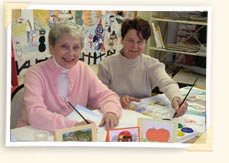 That’s
Progress! That’s
Progress!
At first glance, Wellington Centre artists Ann Hibard and Marielle
Vaillancourt are as varied as night and day. Ann is passionate
about natural food and healing, and Marielle is an expert in
math and computer science. But they share the pain of mental
illness and a determination to fight stigma.
Together, they create gorgeous handmade cards at the Wellington
Card Workshop.
Their work is attracting a growing audience. Over twenty
thousand appreciative people in business, politics, and from
the general
public have already received workshop cards in the mail.
Fighting Stigma
Last spring, the Verdun Cultural Centre asked Ann, Marielle,
and fellow workshop members to exhibit their work with
other local artists. They seized the opportunity as a powerful
way to reduce stigma. “We exhibited at the Verdun
and Nuns’ Island
libraries,” Marielle says proudly. “No one
in the audience knew which of the artists had a mental
illness.
Better
still, we didn’t approach them about showing our
art. They approached us!” Both
Marielle and Ann are thrilled with the Wellington Centre’s
growing presence in the artistic community. Conquering Shyness
Ann recalls, “When I first went to the Wellington
Centre, I was shy. Because I suffer from depression and
anxiety, I
can easily get overwhelmed, and my anxiety can make my
mind race. But when I go to the Card Workshop, everyone
is kind
and supportive—especially Brenda Nixon, who runs
the workshop.
I get so involved with my art that the ‘chattering’ in
my head calms down and the day races by.”“
Then we sell our finished cards at the Wellington Centre’s
Boutique Uniquement Vôtre** and at card sales held
throughout the year at the Hospital and in community.”
Stick Figures…Hardly!
“
I love to help during the card sales,” Ann continues. “It’s
a powerful way to reduce stigma. The customers are genuinely
impressed. Some, when they first arrive, are under the impression
that people with mental illness are just capable of drawing
stick figures or dabbing colours onto canvas. “
These sales give us a chance to show that we are artists
in our own right.”
Restaurant Rudeness
When asked about stigma, Ann confides, “I’m 63
years old, and I’ve seen a lot of discrimination in
my time. “
I’ve been in restaurants,” she confides, “where
people with mental illness are seated at a table, quietly
eating their lunch, and other customers are staring at them,
as if trying to signal to them that they don’t belong.
“ One day, I overheard a customer say, ‘Oh, they shouldn’t
allow those people in here while we’re eating.’ “ At
that point, I got up from my table and joined the people
with mental illness. “ I had to show the customer
that he was being cruel. Most importantly, I had to show
him he was wrong.”
Face to Face
Marielle Vaillencourt, who has a bachelor’s degree
in mathematics and a master’s degree in computer science,
has also felt the sting of discrimination. After some major
setbacks in her life, she became depressed, and had concentration
difficulties and serious memory problems. She tried to continue
working, but found it increasingly difficult. When her sleeping
problems, and concentration and memory difficulties escalated,
she lost her job.
“One day, I came face to face on the street with one of my former colleagues.
She pretended she didn’t see me, stared at the ground, and rushed right
by me as if I was invisible. I wish she could have said hello and not have been
so uncomfortable around me. “
I’ve always been an achiever. Since I couldn’t do my job anymore,
I started to develop my artistic side at the Card Workshop instead.” Marielle enjoys the card sales, “When customers see that people with
mental illness can produce this calibre of art, that’s progress!” |